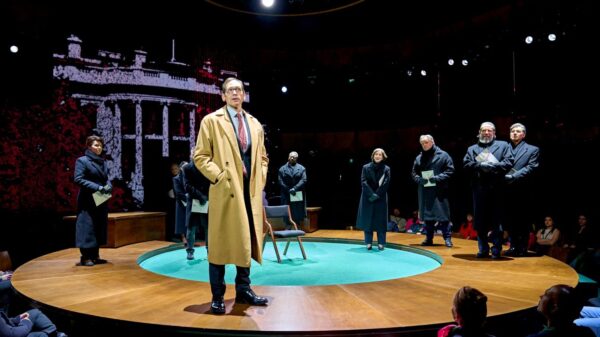‘ROAR’ grabs exclusive access to the Royal Shakespeare Company’s current production of ‘Macbeth,’ performed at the famed Barbican Theatre. This modern take on the chilling Shakespearian classic stars Christopher Eccleston as Macbeth, in his RSC debut, whilst Niamh Cusack portrays a fervent and fiery Lady Macbeth. The performance was followed by an illuminating Q&A session with the cast and crew, which shed further light on many of the directorial specificities and details, enhancing our understanding of the play in its entirety.
As the play begins, the audience is faced with a cloud of eerie white mist, as three little girls dressed in red emerge, chanting. As then run off the stage following their unearthly debut, they giggle shrilly. The audience soon becomes aware of their role as the ‘three witches’, imbuing the play with an undertone of spooky horror-film association from the outset: not only do the girls embody an air of seductiveness that unnerve the audience, their identical red-bowed braids are reminiscent of Kubrick’s ‘The Shining’. It becomes clear in the concluding Q&A with the cast that this was entirely the intention of the director. She wanted to invoke an original perspective on the witches, rivalling their usual stereotypes as ‘old hags’. Further to this, she explained how the use of children exclusively to ‘seduce’ Macbeth and Lady Macbeth seemed the most effective: their inability to conceive meant that the three little girls were a consistent and haunting reminder of this throughout the play, perhaps the underlying reason for their eventual madness.Â
Niamh Cusack commented on this chilling aspect during the Q&A, wryly observing that Macbeth and Lady Macbeth, despite their traditional stigmatisation as villains, were ironically the most loving married couple in Shakespeare, bonded irrevocably in their desperation to conceive. This was consistent with their onstage personas, as it became clear that man and wife stimulated each other’s madness to the extent that it became the undoing of them. Seemingly, they fill the void left by a lack of children with their ruthless ambition for power, driven perhaps more by grief than nihilistic evil.
Cusack plays Lady Macbeth with fervour and brilliance, transitioning incrementally from astute murderess to hysteric wife as her madness takes hold. It could be said that she brings a shining light to the darkness of the otherwise male-led patriarchy, portrayed purposefully by Eccleston as a ‘Military state’. Cusack delivers speech after glittering speech, accessorised by floor-length green gowns, sequins upon sequins, silk capes and killer heels. She comments on this as part of the Q&A, detailing the directorial intention for her wardrobe to become increasingly flamboyant as her madness wore on, a visual indication of her extravagant and self-absorbed madness.
Eccleston’s Macbeth is consistent with the militant persona he aims for – a hardened northern soldier who refuses to admit weakness, Macbeth upholds a wholly masculine identity. Eccleston comments on this, recognising Macbeths unapologetically bloodthirsty exterior as a direct manifestation of his masculine insecurities. Again, this links back to his possible impotence and inability to conceive; the three little girls constantly materialise throughout the play as an eerie and consistent reminder that drives Macbeth forward to murder.Â
Polly Findlay’s production forefronts the importance of time as a consistent theme. The stage is framed by sparse scenery, aside from the ominous porter, who lingers in the background keeping time. He notches up a death toll on the wall as a consistent (and judgemental) reminder of the morbid rhetoric that runs throughout the play. However, the porter attempts to invoke some humour in the play by using comical asides to over-exaggerate the script, despite Ecclestone’s claim that the RSC by no means intended to ‘play it [Macbeth] for a laugh’. To me, a failed attempt at humour undermines the otherwise congruent and consistently eerie thriller, adding an aspect of pantomime that entirely reduces the play’s potency.
However, The porter is instrumental in overseeing a large digital clock above the stage, that counts down the time from Duncan’s death until Macbeth’s. The clock not only permeates the performance with an awareness of mortality, it ominously warns Macbeth that in murdering his king, he has also sealed his own fate.
In a final question in the post-performance Q&A, a well-meaning mother asked for her fourteen-year-old daughter: ‘How could my daughter one day be where you are today?’ Cusack told her to ‘be obsessed’. An obsession with Shakespeare should feed your life-force, she said, should inhabit every crevice of your being and should become internalised into your soul. Certainly cathartic, this question seemed a conclusive and irrefutable explanation for the vivid intensity of each and every performer in this adaptation of ‘Macbeth’.
Tickets for this production are available here.















